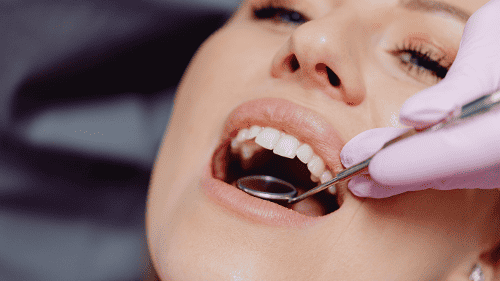
The majority of humans naturally breathe through their noses most of the time. We evolved this way as a method of survival, allowing us to breathe while eating, minimizing the risk of choking. However, some people can’t breathe through their nose due to facial structure or obstruction. Whatever the reason, mouth breathing could lead to serious health issues if left untreated.
The Effects on Oral Health
Breathing through your mouth might seem harmless, especially when you’re congested, but it can negatively affect your oral health. Constant mouth breathing can change how your mouth feels and functions, often leading to complications. Understanding why mouth breathing happens and how it impacts your teeth and gums can help you protect your smile and dental health.
Dry Mouth
Saliva is essential for washing away excess food particles and neutralizing acids. Mouth breathing results in a decrease in saliva production and ultimately a dry mouth. This environment can promote the growth of bacteria and increase the risk of cavities and gum disease.
Tooth Decay and Gum Disease
The lack of saliva makes teeth more susceptible to decay. Also, plaque production increases, which may lead to gum inflammation, gingivitis, or periodontal disease.
Halitosis
Stale air is a breeding ground for bacteria that cause bad breath. Sufficient saliva can combat halitosis and reduce bad breath.
Growth and Development in Children
Chronic mouth breathing in infancy can lead to a narrow upper jaw, a high-arched palate, and dental crowding. This occurs when the tongue does not rest against the roof of the mouth, but instead, close to the bottom teeth. This can contribute to restricted jaw development, a bad bite, or malocclusion, making the face structure appear elongated and thin.
Other Conditions
Children who battle to breathe through their noses are prone to teeth grinding, primarily at night. The combination of jaw misalignment and muscle imbalance can also lead to temporomandibular joint (TMJ) disorders (the small hinge that lets your jaw move up and down, and side to side, so you can talk, chew, and yawn). For example: pain, clicking or popping noises, stiffness, headaches, and jaw locking.
The Effects of Mouth Breathing on Sleep and Posture
Not only is mouth breathing detrimental to oral health, but it can also cause unhealthy posture and negatively affect sleep quality. As breathing through your mouth is usually a sign of airway obstruction, the head will tilt forward to facilitate air intake. Over time, this causes strain on the neck and upper back, causing pain, which results in poor sleep quality.
Repeated neck pressure can ultimately affect the entire body, potentially causing muscle weakness, shoulder asymmetry, and spinal complications. Unhealthy sleep posture may also lead to headaches and discomfort during the day.
Mouth breathing can cause or worsen existing sleep apnea by increasing resistance in the airway, narrowing the pharynx, and leading to severe breathing difficulty. This challenge further disrupts sleep patterns, lowers oxygen levels, and places extensive pressure on the respiratory system. These issues often result in fatigue, high blood pressure, and cognitive problems.
The nose filters, warms, and humidifies the air that we breathe in before it reaches our lungs. Bypassing the nasal filtration process can increase the risk of respiratory infections. Breathing through the mouth exposes individuals to cold, dry air that contains pathogens, which become infections like sinusitis and flu.
What Is Airway Dentistry?
Airway dentistry is a specialized field that connects oral health and breathing. It involves identifying and treating dental issues that can turn into breathing problems like sleep apnea, snoring, and mouth breathing. Treatments include orthodontics, oral appliances, and myofunctional therapy.
What Issues Does Airway Dentistry Address?
- Structural problems – focuses on the relationship between the jaw, palate, and airway, including misaligned jaws, crowded teeth, and underdeveloped oral structures.
- Functional habits – issues like dysfunctional swallowing patterns or tongue ties that may affect breathing.
- Overall well-being – recognizes that breathing problems can affect overall health, which can lead to issues like fatigue, poor sleep quality, and difficulty concentrating.
How Is Airway Dentistry Performed?
Airway dentistry focuses on finding and treating the causes of breathing problems that affect your mouth and health. It examines how your teeth, jaw, and airway work together to help you breathe and sleep better. Before treatment, we’ll take the time to understand your unique needs and create a plan that supports your comfort and long-term wellness.
- Advanced diagnostics – we use advanced imaging, like Cone-Beam CT (CBCT) scans, to create clear 3D pictures of your airway, jaw, and nasal passages. These images help us see what’s going on beneath the surface.
- Comprehensive evaluation – we examine how your mouth, jaw, and breathing work together. We’ll also discuss your sleep patterns to get a complete understanding of your health.
- Treatment planning – once we understand the cause of the issue, we create a personalized plan to improve your breathing and overall comfort.
- Treatment options – depending on your needs, treatment might include orthodontic care, a custom oral appliance for sleep apnea, myofunctional therapy to retrain muscles, or correcting tongue-ties and other structural concerns.
Address Mouth Breathing Concerns Today
Mouth breathing can silently change how your teeth and jaw develop and function. It can affect your bite, cause alignment issues, and even alter facial structure if left unaddressed. The good news is that with the proper care and guidance, these problems can often be corrected or prevented. Contact us today for a personalized plan on mouth breathing and its effects on your oral health.